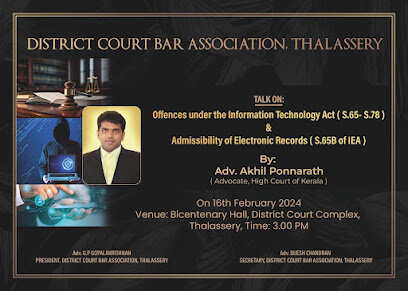Best Collaborative Law Lawyers in Kannur
Share your needs with us, get contacted by law firms.
Free. Takes 2 min.
Free Guide to Hiring a Family Lawyer
List of the best lawyers in Kannur, India
About Collaborative Law in Kannur, India
Collaborative Law is an alternative dispute resolution process where parties involved in a legal dispute work together, with the guidance of their respective lawyers, to reach a mutually agreeable settlement without going to court. In Kannur, India, collaborative law is most commonly utilized in family law matters such as divorce, child custody, and property division, but it can also be applicable to various civil disputes. The emphasis is on open communication, transparency, and cooperation rather than adversarial legal proceedings. By opting for this approach, individuals aim to resolve conflicts amicably, reduce stress, and often save time and money.
Why You May Need a Lawyer
People in Kannur may seek legal counsel in the field of Collaborative Law for several reasons:
- Divorce and Separation: When couples want to end their marriage amicably and agree on terms without litigation.
- Child Custody and Support: Parents seeking a cooperative arrangement for the welfare of their children.
- Property and Asset Division: When parties need assistance in fair division of shared assets and debts.
- Business Disputes: Business partners looking to resolve conflicts discreetly and efficiently.
- Inheritance and Succession: Families seeking to settle inheritance matters without contesting wills in court.
- Workplace Disputes: Employers and employees aiming to resolve disagreements through negotiation and collaboration.
Often, individuals turn to collaborative law to reduce emotional and financial costs, maintain privacy, preserve relationships, and avoid lengthy court battles.
Local Laws Overview
In Kannur, as in the rest of Kerala and India, collaborative law operates alongside the traditional judicial system. While the Indian legal framework does not have a separate statutory provision specifically for collaborative law, its principles are recognized within the broader scope of Alternative Dispute Resolution (ADR). Pertinent legal frameworks include:
- Code of Civil Procedure (CPC), 1908: Encourages settlement outside the courtroom through mediation or conciliation.
- Family Courts Act, 1984: Emphasizes reconciliation and the settling of disputes amicably, especially in matrimonial matters.
- Arbitration and Conciliation Act, 1996: Provides procedures for alternative dispute resolution mechanisms.
Lawyers participating in collaborative law agreements in Kannur help their clients negotiate in good faith, facilitate transparent communication, and draft legally binding agreements reflecting the settlement. Importantly, if the collaborative process does not lead to a resolution and litigation ensues, the collaborative lawyers must withdraw and cannot represent their clients in court proceedings, ensuring everyone’s commitment to settlement.
Frequently Asked Questions
What is the main goal of Collaborative Law?
The main goal is to resolve disputes without going to court by fostering open communication and cooperation between parties, leading to solutions that work for everyone involved.
How does Collaborative Law differ from mediation?
In collaborative law, each party has their own lawyer present during the process, while mediation typically involves a neutral third-party mediator who assists both sides. Collaborative law ensures legal guidance throughout negotiations.
Is Collaborative Law recognized by courts in Kannur?
While there is no specific collaborative law statute, courts in Kannur recognize and encourage settlements achieved through alternative dispute resolution, including the outcomes of collaborative law processes.
What types of cases can be resolved through Collaborative Law?
Primarily family disputes (such as divorce and custody), property divisions, business disagreements, and inheritance matters are well-suited for collaborative law.
What happens if the collaborative process fails?
If collaboration fails, both parties must find new lawyers if they wish to proceed to court. This ensures that everyone involved is committed to reaching a settlement during the process.
Are the agreements reached through Collaborative Law legally binding?
Yes, once all parties sign the settlement agreement, it is legally binding and enforceable by law.
How long does the Collaborative Law process usually take?
The duration varies but is generally shorter than court proceedings since it depends on the cooperation of the parties and how quickly agreements are reached.
Can Collaborative Law help maintain privacy?
Yes. The process is private and confidential, and details discussed are not part of the public record, unlike court proceedings.
Do both parties need to agree to collaborate?
Yes. Both parties must willingly opt into the collaborative process and commit to negotiate transparently.
Will I need to attend court if I choose Collaborative Law?
You usually do not need to go to court if a settlement is reached. However, for formalizing agreements (as in divorce), minimal court involvement may be required to give the settlement official legal standing.
Additional Resources
If you want to learn more or need assistance, these resources may be helpful:
- Kannur District Legal Services Authority (DLSA): Offers free legal services and information on ADR.
- Kerala State Legal Services Authority (KELSA): Provides guidance on alternative dispute resolution procedures.
- Family Courts in Kannur: Handle matters related to family disputes and encourage reconciliation efforts.
- Bar Association Kannur: Source for finding collaborative lawyers and legal practitioners experienced in ADR.
- Local Law Firms and Advocacy Groups: Many law firms in Kannur specialize in collaborative dispute resolution and can guide you through the process.
Next Steps
If you are considering the collaborative law process in Kannur, follow these steps to begin:
- Assess your situation and determine if you and the other party are willing to cooperate to find a solution outside court.
- Consult a lawyer in Kannur who is experienced in collaborative law to discuss your options and suitability for the process.
- Ensure all parties agree to work collaboratively and sign a participation agreement outlining the process and commitments.
- Engage in open and guided discussions with the help of your lawyers to negotiate a fair settlement.
- Once an agreement is reached, have your lawyer draft and review the settlement to ensure it is legally sound and enforceable.
- If court formalization is required (such as in divorce cases), your lawyer will help file the necessary paperwork to make the agreement official.
- If the collaborative process does not yield a settlement, you will need to consider alternative dispute resolution methods or litigation with new legal representation.
Collaborative law offers a constructive, respectful approach to resolving disputes. Seeking professional legal guidance can help ensure your rights and interests are protected throughout the process.
Lawzana helps you find the best lawyers and law firms in Kannur through a curated and pre-screened list of qualified legal professionals. Our platform offers rankings and detailed profiles of attorneys and law firms, allowing you to compare based on practice areas, including Collaborative Law, experience, and client feedback.
Each profile includes a description of the firm's areas of practice, client reviews, team members and partners, year of establishment, spoken languages, office locations, contact information, social media presence, and any published articles or resources. Most firms on our platform speak English and are experienced in both local and international legal matters.
Get a quote from top-rated law firms in Kannur, India — quickly, securely, and without unnecessary hassle.
Disclaimer:
The information provided on this page is for general informational purposes only and does not constitute legal advice. While we strive to ensure the accuracy and relevance of the content, legal information may change over time, and interpretations of the law can vary. You should always consult with a qualified legal professional for advice specific to your situation.
We disclaim all liability for actions taken or not taken based on the content of this page. If you believe any information is incorrect or outdated, please contact us, and we will review and update it where appropriate.













